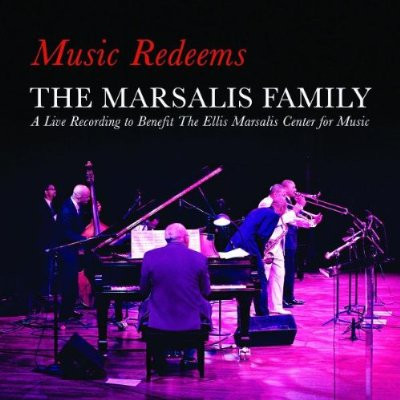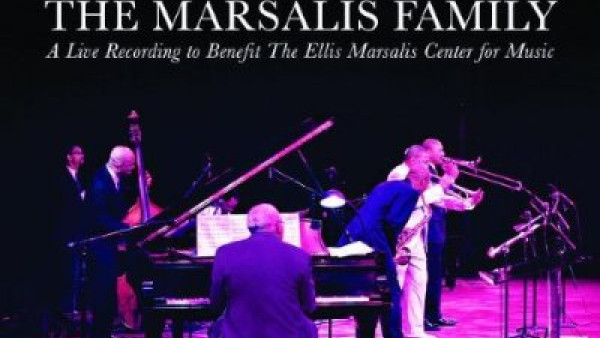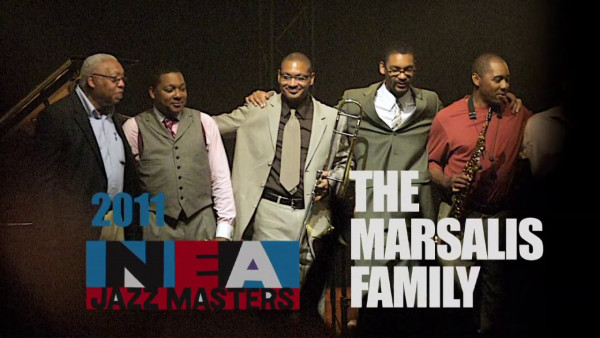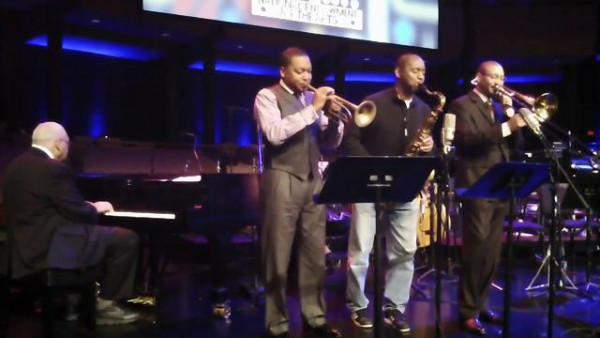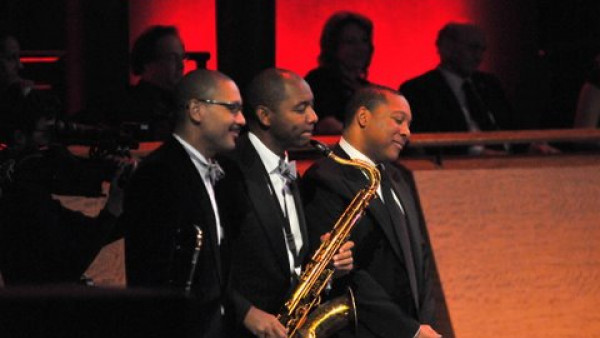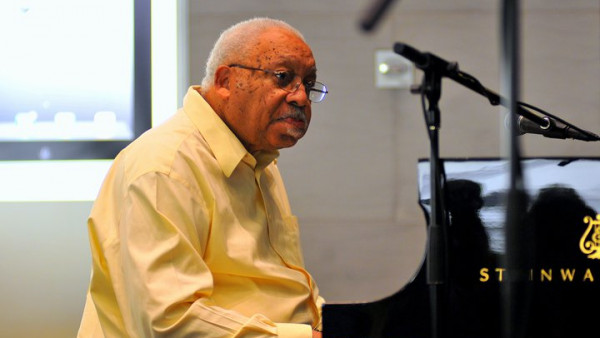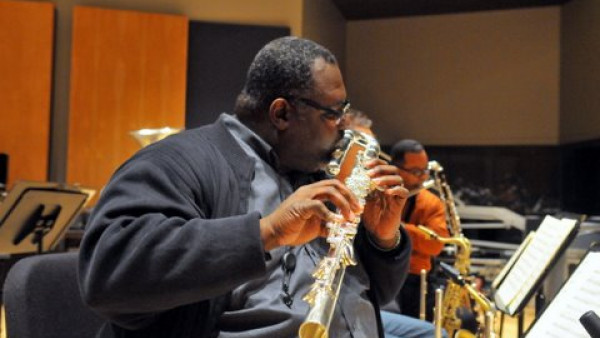Team Marsalis: All in The Family
Jason Marsalis looks serious as he fiddles with his drum sticks at Manhattan’s Apple Store. He’s sitting at his trap set, paces away from his dad, pianist Ellis, getting ready to hit. But then again, Jason often looks serious. Perhaps the snap he brings to his music demands it … or perhaps not. As the father and son start to ignite with bassist Jason Stewart, the drummer begins to get his grin on. The spry way he delivers his swing pretty much demands a smile or two. Goading his dad’s glide over the keys, he helps bring an elan to the room. The Marsalises have a way of quickly connecting.
But with five busy careers in play at once, the Marsalises don’t manage to connect all that often. So this evening is somewhat special. During an informal set celebrating the iTunes arrival of Ellis’ An Open Letter To Thelonious, the pianist’s other sons jump up and blow a bit as well. Trombonist Delfeayo, saxophonist Branford and trumpeter Wynton arrive at the store one by one, taking the stage in a casual way, and enjoying the heck out of standing shoulder to shoulder while kicking around some standards. All of a sudden, those grins are everywhere.
The quintet did something similar in a much more formal setting two summers ago at Washington D.C.’s Kennedy Center, a show that was turned into Music Redeems, a live disc benefitting the nearly complete Ellis Marsalis Center for Music back in their home town of New Orleans. That was a year-and-a-half ago, and the five musicians haven’t been in a performance together since. This little Apple gathering, which found Delfeayo throwing down some exquisite ’bone lines, came about because they were all in town to participate in the National Endowment for the Arts’ Jazz Masters ceremony. Along with Hubert Laws, Dave Liebman, Johnny Mandel and Orrin Keepnews, the five Marsalises were receiving the prized designation and performing at a high-vis concert the following night at Lincoln Center. You could call this a rehearsal of sorts. And, yes, it was worth it. They rather killed with some high-flying polyphony when the big night came and they smoked their way through Jason’s “At The House, In Da Pocket.”
During this two-day stretch, all the award winners, especially Team Marsalis, were part of panel discussions, photography sessions and interview spots that examined the impact of their careers. DownBeat thought it was a great time to grab the guys, who span in age from Ellis’ 76 to Jason’s 34, for a chat about family dynamics and the way jazz has impacted their lives. Convened in a meeting room adjacent to Dizzy’s Club Coca-Cola, the guys laughed and chatted. Ultimately, it turned into a trip down memory lane while managing to include a bit of controversy, too. I began by addressing Ellis as “Master Marsalis,” echoing a fawning audience member who made a mark at the panel discussion the day before. Some brothers cracked up, some winced. Dad had the final word, though. “It’s cool if you call me that … as long as I don’t believe it.”
DownBeat: You guys went to the funeral service for Dr. Billy Taylor last night. Was it thought-provoking?
Wynton: I thought it was extremely soulful. The diversity of the people who showed up? Wow. He did a lot to unite people. I knew him, but I didn’t have a real understanding of the ways he touched people until I saw that community come together.
Branford: When you grow up in New Orleans, people talk about death all the time. Some of my boys used to go and hang out at the St. Louis Cemeteries in the middle of the city, and ponder why roaches used to sit on the sides of the tombstones, you know? We’re not afraid of death. When people die in New Orleans, it’s like, “Say, you heard so-and-so died? You going to funeral? Alright.” Bands playing, guys getting paid. When I moved up here, it was like death was a taboo subject. But it doesn’t bother me. It’s what it is, and it’s coming for all of us.
Ellis: Plus, the culture I grew up with in New Orleans has the tendency to reflect the Christian concept of death: “rejoice when you die.” They believe the person has gone to a better place. That’s what the second line celebrates. I remember a friend of ours passed away, and I was talking to one my classmates, and the expression they’d use was, “Yeah, man, he had a great sendoff.” Like there was a kind of acceptance of the idea that he was gone, and that was cool.
DownBeat: OK, let’s talk family. You guys don’t share the stage all that often. What’s the chemistry when you get together to perform?
Ellis: That’s kind of hard to describe. See, we don’t do this enough for it to get to be routine by any means. But one important thing is that everyone has maintained a level of excellence on their instrument, so everyone can stand on their own two feet. And me being the elder statesman, I’m happy not being dragged along.
Branford: When I share the bandstand with Wynton, I can read his thoughts. But that’s no surprise: We lived in the same room together for 19 years. Jason is 17 years younger than me. And Delfeayo is five years younger. When we were growing up, it was me and Wynton, and Ellis and Delfeayo. Even though Ellis doesn’t play an instrument, those two have chemistry together. Now that we’re older, we have a thing; people who have brothers know this. Even when you can’t stand your brother, there’s a weird family energy at work. Wynton and I have a bond.
DownBeat: What about roughhousing?
Branford: We had this one thing we did: playing football in the living room — me and Wynton vs. Ellis and Delfeayo, and Jason was the football, literally. We’d say “hike” and Jason would move forward; we’d be blocking, pushing the furniture around. When my mom found out, she was not very pleased.
Ellis: Hahahahaha.
Branford: And I think that those kind of things actually aid in playing music. They have nothing to do with music, but everything to do with music.
Wynton: Branford and I would play a lot of gigs together. It was the early ’70s when Earth, Wind & Fire was coming out. We’d write out the notes to their tunes in words like “F-sharp, G” instead of the notes themselves. And sometimes our father would let us play with him on the bandstand. They could play; we couldn’t. We were sad, you know, but he encouraged us. We have as much dysfunction as any family, maybe a bit more. The first time we all got together to play [as adults], I was thinking, “Oh man, we’re gonna have to deal with some things here,” but what shocked me turned out to be the fact that it wasn’t like that at all. It went well. I think it was mainly from the respect we had for my father. We all know he had a time out there. He was struggling to feed us and play this music. When we come together, the amount of respect is overwhelming.
Branford: When I was in Wynton’s band, we’d always be fighting over some stupidity. I remember one day he was going to do push-ups or something and kick my butt. We’d fight during the day, but by the time of the gig, when the music would start, we’d turn to look at each other and it would be gone.
Wynton: When you play with someone as good as Branford, it’s different—it’s not just that we’re brothers. I was spoiled by playing with him. We came to New York, and every gig I got on, I tried to get him on. “You gotta call my brother, man. My brother can play.” I told Herbie [Hancock] and them, “What about my brother? Get him on this gig.” Used to beg Woody Shaw: “This is the cat, check my brother.”
Branford: And they were like, “To hell with your brother.”
DownBeat: Sounds like in the back of your mind you knew that’s what your dad would’ve wanted you to do: take care of family.
Wynton: Nah, he wasn’t like that. My daddy’s not the type of person to force you to do stuff. He did what he was doing. He was a man and you were a boy—it was always clear. He wasn’t going to live his life through you. Like, “You do your thing, I’m doing my thing, and good luck. If I can help you, I will. If not, God bless you.”
Ellis: No, I was never a stage-door dad. I’m not sure what conditions would have had to existed for me to been a stage-door dad. If the music we were trying to play had been in a popular vein, say like Joe Jackson and the Jackson 5, and money was involved, well, who knows?
Wynton: Damn sure there was no money with us. There was less than money. We were cheap labor, the guys who carried the Fender Rhodes. Like, “OK, pick up this end, let’s move this thing.”
Ellis: People used to ask all the time: Why don’t y’all have a family band? I never wanted no family band. And sometimes it sounded like, “Oh man, you’re jealous of them.” But that’s not what it was about.
DownBeat: Ellis, do you remember these guys playing together?
Ellis: I used to go to some of those gigs.
Wynton: He sat in. It almost killed him.
Branford: He’d just sit and laugh. It was at my high school. We were playing the Crusaders, “Keep That Same Old Feeling.”
Wynton: He came up and played it with us and we’d hit the bridge with all these changes on it, and we’d be bullshitting on the changes and he’d be like, “Oh, no, no, that’s not the way it goes. You gotta deal with these changes, baby, here it is …”
Everyone: Hahahahahaha!
Wynton: Cats would say, “Yeah, man, your daddy can play!”
DownBeat: Were you guys wincing, embarrassed that he was in your space?
Wynton: We were so happy to see him show up a gig. And the cats in our band were happy. “Get him to play with us!” They loved it.
Branford: That’s what I didn’t understand, that strange thing I’d see on TV all the time, like, “Jesus, dad, what are you doing here?” We didn’t have that vibe with our parents. We were happy to see them.
Wynton: Plus, when he sat in, he made something clear.
Branford: Yeah, “I can play, and y’all can’t.”
DownBeat: When did you truly realize that he was heavy?
Branford: When I was 1 year old, 2 years old.
Wynton: We always knew he could play— that was never a question. He’d practice. Plus, when we started playing ourselves, and realized what it actually took, we really knew he could play. Because you hear him and you could hear yourself. No comparison, right? And he was cool about it, so you’d had to be cool, too.
Ellis: I think that a lot it had to do the philosophy of teaching that evolved over a period of time …
Wynton: This is before the teaching. I remember clearly. It was the ’60s, and I remember a gig with the Xavier University band and he played bass on the gig. The bass player didn’t show and they called him up. I might have been 9 years old, and we were sitting in the audience because [trumpeter John] Fernandez had some fine daughters, so we were always there.
Branford: He sure did …
Wynton: And we’d be the only kids at the concert. We said, “Damn, man, Daddy’s playing bass!” I remember it like it was yesterday.
Branford: Yesterday Cedar Walton told me: “The first time I met Ellis he was playing bass and I was playing piano. It was in 1951.” He can play sax, too.
Wynton: I remember being in the bathroom one day and hearing a horn playing Charlie Parker. I said, “Damn, Branford finally learned how to play that thing?” I came into the living room and it was Daddy.
Branford: Lots of kids would say, “Hey, my dad’s a drag.” I’d say, “My dad’s kind of cool.”
DownBeat: Ellis, you were known for trying to play modern jazz in a world where trad was king.
Ellis: I remember a banjo player named Albert French, “Papa.” He played with the old guys. His oldest son was around my age. I knew the family from when we lived in Gert Town. We ran into each other occasionally, and once I saw Papa French and he said, “You guys need to come out and learn how to play this music. Some of these old guys are passing on, and the younger folks don’t know how to play it.” And I said, “Yeah, Papa French, you’re right.” But to myself I was saying, “I don’t want to play that crap.” I was about 40 years old before I really understood the connection between early jazz and what we were trying to do in a more modernistic vein. It wasn’t really that far apart, but when I heard it at the time, well … let’s just say you want to deal with your peers.
DownBeat: Artistically, you don’ t want to look over your shoulder.
Wynton: You have to be of your time. You might be the kid who says, “Let’s study something [old],” but you’re still of your time, because your relationship with others is going to be based on all them saying, “No, let’s not.”
Branford: If you start listening to Sidney Bechet, they can’t say you’re stuck in the ’20s. My outlook centers on what’s taking place now. I just use older music to make myself better.
Ellis: I remember being in Japan with Wynton one time and the interviewer asked, “Why are you not in your son’s band?” I said, “For me to play in Wynton’s band would put a date on what he’s doing. He needs to have people with him who have ideas that make it possible for growth. That wasn’t something I could do. It wasn’t whether I could play or not. It had to do with the evolution of what takes place when people get together at a particular time and start to play. I wasn’t a part of that scene. I was a part of something that came before.
DownBeat: You guys don’t play together all that often. Do you ever surprise each other on the bandstand?
Wynton: I know what Delfeayo’s playing sounds like. I know what Jason’s playing sounds like. Everyone is going to play something you don’t know on the bandstand. That’s part of the fun. But I know how they play.
Ellis: When you’re in a jazz situation you access a common language. Of course, there are some people who aren’t interested in that. I remember I said to Wynton [when he was growing up], “Man, you gotta learn how to play ‘I Can’t Get Started.’” And he didn’t like that tune at all. But that’s one trumpet players need to know. Last night at the Apple Store, we played common form tunes. The standard things, “Sweet Georgia Brown” and such. If people know them, there’s no problem.
DownBeat: What about you, Jason? You and your dad play together a lot.
Jason: It was very different by the time I came along. I lived in the house with him. He’d use me on his gigs. I’ve enjoyed playing with him for years. But it took me a long time to understand how to play with him. It wasn’t until I started listening to trio records that I figured it out. I grew up with combos and quintet records: Clifford Brown Quintet, Miles Davis Quintet. But when I got into the Oscar Peterson Trio and Ahmad Jamal Trio it was, “Oh, OK, this is how it works.” I figured out how to play behind him and really do it right. After a while I knew his playing better, and knew how to communicate with him.
DownBeat: Delfeayo, you’ve produced recordings for your father, Branford and Wynton. What’s that like?
Delfeayo: Well, as a kid I remember lying under the piano while my dad played, thinking how great it would be to actually capture the way I felt and transfer it to a recording. His tone was warm and his playing was smooth—it had an inviting quality. My first understanding of production came from Branford, who taught me how to create a feedback loop on Dad’s old Tascam reel-to-reel. When transferring old records to tape, he’d mix his voice over the music first, introducing the songs and musicians, fade the music out and then transfer the entire record. That started me thinking about how the music was presented. Later, Wynton challenged me to use a $10 Radio Shack mic and $40 tape deck to make his demo tapes sound like Maurice André’s classical trumpet recordings. I started experimenting in different rooms or outdoors, with mic placement and distance, not knowing about large halls, recording studios, reverb or high-end equipment. The great part about working with Dad, Branford and Wynton is that they allowed me to experiment. It didn’t always yield the best results, but I learned what worked and what didn’t in various situations.
DownBeat: Let’s talk NEA: Yesterday Dave Liebman was emphatic about it being the government’s job to support the arts. You guys agree? Should funding for arts come right along with defense and infrastructure? Should art be supported by tax payers?
Ellis: I was on the panel when the first Jazz Masters [grants] were introduced. At the time, the government had given money to the NEA, but our portion of the jazz grant was a total of $276K to be divided by 50 states. So we had to go to the meetings and bring the grants. The people on the East Coast had developed a system, so they got most of the money because there were people in other parts of the country that didn’t even know how to write a grant. I thought that was ridiculous. We should have had millions of dollars to spend.
DownBeat: A recent column by jazz journalist Nate Chinen commented on the wisdom of including the entire Marsalis clan—all five of you—in the Jazz Masters acknowledgement. The crux of the query was whether the designation shouldn’t be exclusively for Ellis, a musician who’s lived a long life as an artist and educator, rather than his kids, whose impact likely hasn’t been felt in its entirety yet.
Wynton: I didn’t even see that. But I agree with it. I don’t know about Delfeayo [and Jason], but me and Branford talked about it.
Branford: Yep, I agree with that.
Wynton: We didn’t really want to [go along with it], but we didn’t want to seem ungracious.
Branford: If I was the NEA and I had an opportunity to create a certain kind of “market share” for lack a better term, I’d … Hey, I said it in 2005: you get any of us to play a concert in D.C. and, well, Wynton could conceivably sell out the Kennedy Center. The rest of us could not. You put all of us on the stage at one time? Bam: Sold out. So it seems to me that if I was living in D.C. and I went to that Marsalis family concert last June, and I saw all those people who went to it who normally wouldn’t go to a jazz show, I might want to keep us all together. I was in New Orleans and I met [Republican National Committee Chairman] Michael Steele at a hotel, and Michael Steele didn’t know who I was from Adam. I said, “Hi, yeah, my name’s Branford Marsalis.” And he said, “Oh yeah, the musician.” And he had an aid who’s a true Republican with a blue suit and red tie, and he said, “Yeah, man, you guys did that concert in June. That was the greatest jazz concert I’ve ever been to in my life.” Now, if that concert has that kind of impact on people who wouldn’t be caught dead near jazz, it makes perfect sense to use it as a way to build better awareness for the award, and from that angle it’s clearly succeeded. Because a whole bunch of people are talking about the Jazz Masters awards who didn’t know it existed beforehand. Is it fair? No. But is it reality? Yeah. Given that, we said, “Hey, OK, let’s do it.” The money goes to my dad, so the only thing we get is the title. And like I asked the NEA guy, “Since I’m not a master, when I actually become a master, does that mean I get another $25 grand?” He basically said, “No.” He turned the corner and said, “Yeah, I’m looking forward to seeing you …” [laughing] So I’m actually getting screwed here. But it’s all good.
DownBeat: Don’t be tapping dad for the loot, now.
Wynton: Oh, we’ve tapped him plenty of times.
Branford: But, really: The amount of collective griping that goes on is funny to me. I didn’t ask for the award, just like I didn’t ask for that record contract when they gave me one. And when a very successful jazz musician came up to me and said, “You don’t deserve that contract,” I said, “I know I don’t, but they gave it to me— what was I supposed to say, ‘no’?” And after tonight, we’ll have this NEA thing.
Delfeayo: It reminds me of when Wynton and Branford first came out and people were upset at their success and said they hadn’t paid their dues, and they’re just neo-classicalists bringing jazz backwards, and blah blah blah. It just gets old.
DownBeat: Let’s close by explaining the thrust of the Center.
Branford: Yeah, it’s terrible, isn’t it? The funny part is that he’s still here.
Wynton: [puts on a faux haughty voice] Ahem … As I was saying, “the good time has already been had.” But, you know, there’s nothing wrong with talking about stuff like this. It’s a dialogue. Talk it up, man!
DownBeat: Ellis, your new iTunes record is all about Monk. What’s the toughest thing about getting Thelonious right?
Ellis: At first it was intimidating; I avoided him for a while. But as I got older and started listening more, it became less so. When Miles did “Straight No Chaser,” he had it in the wrong key. We all learned it wrong from that. On [the new] record, we fixed it. It’s in B-flat. But [it’s not as if] people play a lot of Monk now. When Branford and Wynton were young, and I first told ’em about Monk, they went, “bharrrgghh.” They didn’t want to hear nothing about it. I said, “That’s OK, we ain’t gonna argue about it. You’ll see.” A Monk tune that’s hard to crack is “Crepuscule With Nellie” — “Evidence,” too. That’s not ordinary stuff. It was Jason’s idea to do the Monk. Listen to what he’s doing on that CD, man.
DownBeat: Let’s close by explaining the thrust of the Center.
Ellis: Branford and Harry Connick came to New Orleans after Katrina and saw the devastation up close. They decided to do something to help, and hatched a plan to make a musician’s community center. They raised the money, and decided they’d name it for me. As it stands, it’s due to open this summer. It’s a community center with an emphasis on music. It’s necessary to have a cohesive artistic experience, and as Delfeayo can tell you, trying to find a venue to do something in is tough. Delfeayo worked with young kids, and he had the Uptown Music Theatre and Uptown Jazz Orchestra. Trying to find a space to consistently do the work is difficult. This center will go a long way of solving that problem. It’s not a concert hall, it holds about 250. Theater, dance—lots of people can use it. We’re hoping it helps a community that really needs it.
By Jim Macnie
Source: Downbeat (April 2011)

